Martijn Schirp • • 30 min read
How to Defeat the Procrastodragon Once and For All
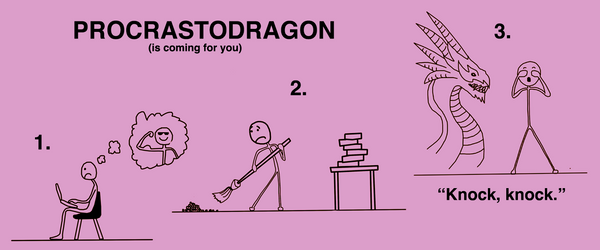
The most intelligent men, like the strongest, find their happiness where others would find only disaster: in the labyrinth, in being hard with themselves and with others, in effort; their delight is in self mastery; in them asceticism becomes second nature, a necessity, an instinct. They regard a difficult task as a privilege; it is to them a recreation to play with burdens that would crush all others.
— Friedrich Nietzsche, The Antichrist
Articles like the one you’re reading now typically start with a confession by the author. Probably by necessity, because you, the reader, rightfully want to know if this internet-guy knows what the hell he’s talking about.
Does he truly understand my suffering and struggles? My unique strategies of self-deception? Does he know my biology and bad habits? The events that have made me who I am? And has he resolved these issues within himself in such a way he can shine a light on my own and help me fix them?
Deep down, you want to know if this is another one of those articles that make you temporarily feel good, but is rather quickly forgotten. Or worse, an article that offers tremendous insight, only to be used as additional ammunition to judge yourself into an even deeper procrastination paralysis.
I believe these reservations are valid, so I’d like to share you a little bit of my story. I hope to show you this article is none of the above, and that by fixing the core existential issue at the heart of procrastination, you can no longer see it as an option.
Honestly, it is possible to overcome procrastination. The key is to aim so far away from self-defeating behavior that you can no longer seriously consider it an option.
I am sure you can picture some individuals who do exactly this.
However, I wasn’t always like this. I had to learn it, the hard way.
Ever since I can remember, from the first moment I got my hands on a Gameboy, I loved to immerse myself in virtual worlds. I can still feel the excitement when hearing the sound of the 56k modem dialing into the web. In time, it became more than mere immersion. I would use games and the internet to escape, to drown my sorrows with distractions.
I let myself be bullied at school, and didn’t have many friends. I was sufficiently different from my parents and siblings, who I struggled to talk with. Instead, all I did was play video games for hours on end. I would lock myself up in my room and spend days writing posts on discussion forums. I discovered a world I was competent in, a place where I could lose the dread of my embodied existence and enter a virtual world that seemingly held more meaning.
The pattern was set. Whenever there was something I didn’t want to face in the real world, so to speak, I would instead do something more funbut in the virtual one. Problem solved.
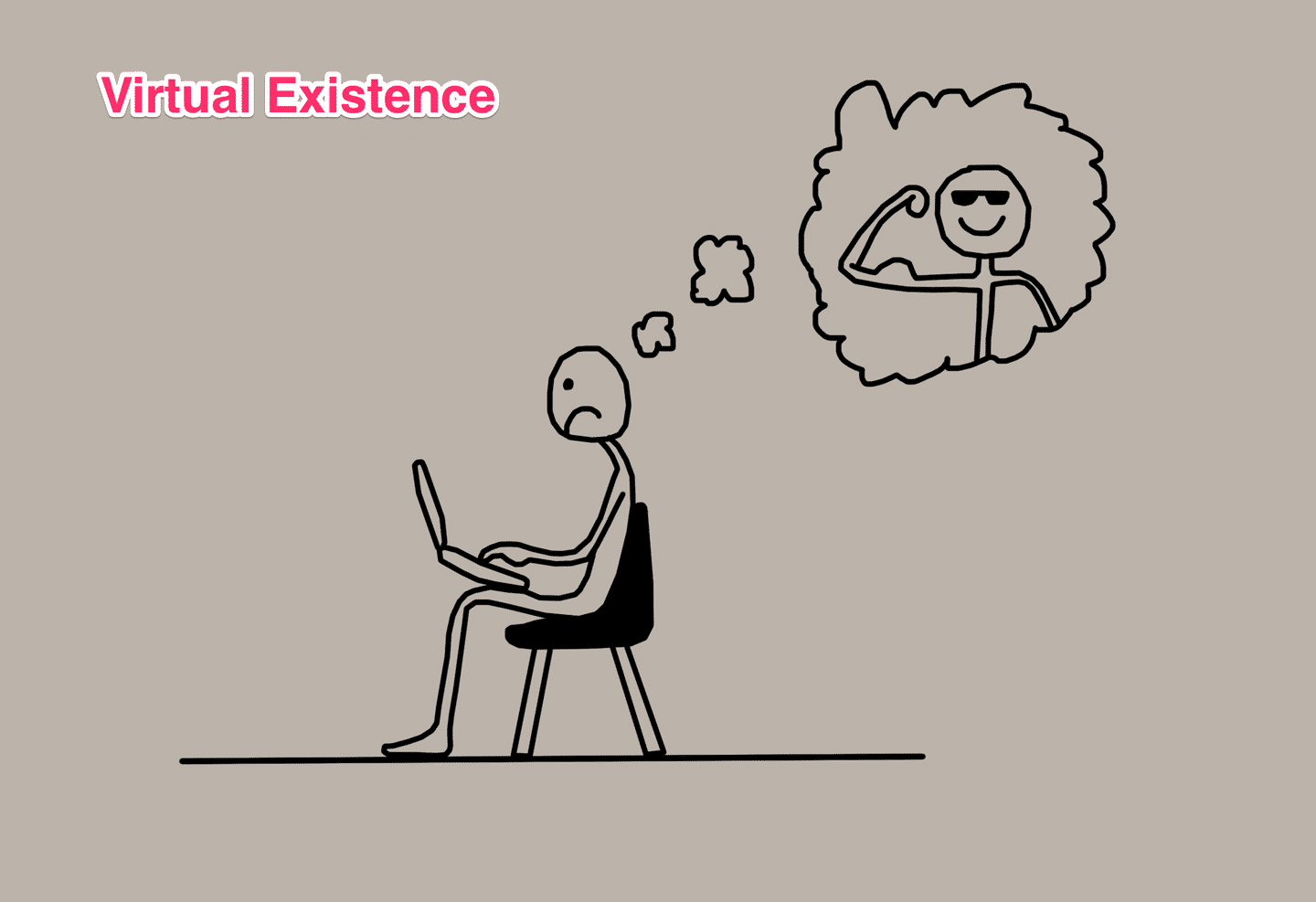
Now, this never seemed an issue to me. I got along well enough. And while I never achieved what, or became the person who, I knew I was capable of, I was lucky and crafty enough to entertain a positive self-image, and to carve out a comfortable existential niche. (This is what I call a success barrier, more on this later.)
Obviously, this didn’t last forever.
When I had to write my philosophy thesis I found out I truly had a problem. This was a serious project. And as an ambitious young lad with an aggrandized self-image, I set the bar high.
I wanted to write about something very dear to my heart, about the ethical responsibility to the non-human Other and the perception of animistic cultures, a perspective that wouldn’t easily be accepted within the academic mainstream.
But no matter how important the topic was to me, or how terrifying the ramifications were if I couldn’t complete it in time, I was just unable to do it. Every day I started with good intentions, but felt anxious, and would fool myself into doing something else, for just a moment. I would play chess, thousands of online blitz games, scroll Reddit for hours, mindlessly, and then smoke weed to numb the anxiety. These innocent seeming moments strung together into days, weeks, and then months.
Of course I still did the required minimum so I could still live with myself—exercise, social events, reading books. (This is what I call support levels, more on this in a moment.)
But whatever I did do, starting on my thesis was not one of them, even though I knew full well I had a deadline, and not meeting it would screw up my life.
At the end of another fruitless day, I was feeling worthless, depressed, incompetent, and anxious. I felt it all. Fear, doubt, bitterness, resentment, rage. I couldn’t sleep. I was making excuses and persuading myself to believe them. I even started to care less about my health and my social life. My visions became bleak and dark. I was living in a hell of my own creation.
After missing yet another deadline, and humbly asking for another extension, I started to fear the not-doing more than the doing. I had to admit to myself that I always had been a chronic procrastinator, and I couldn’t continue like this.
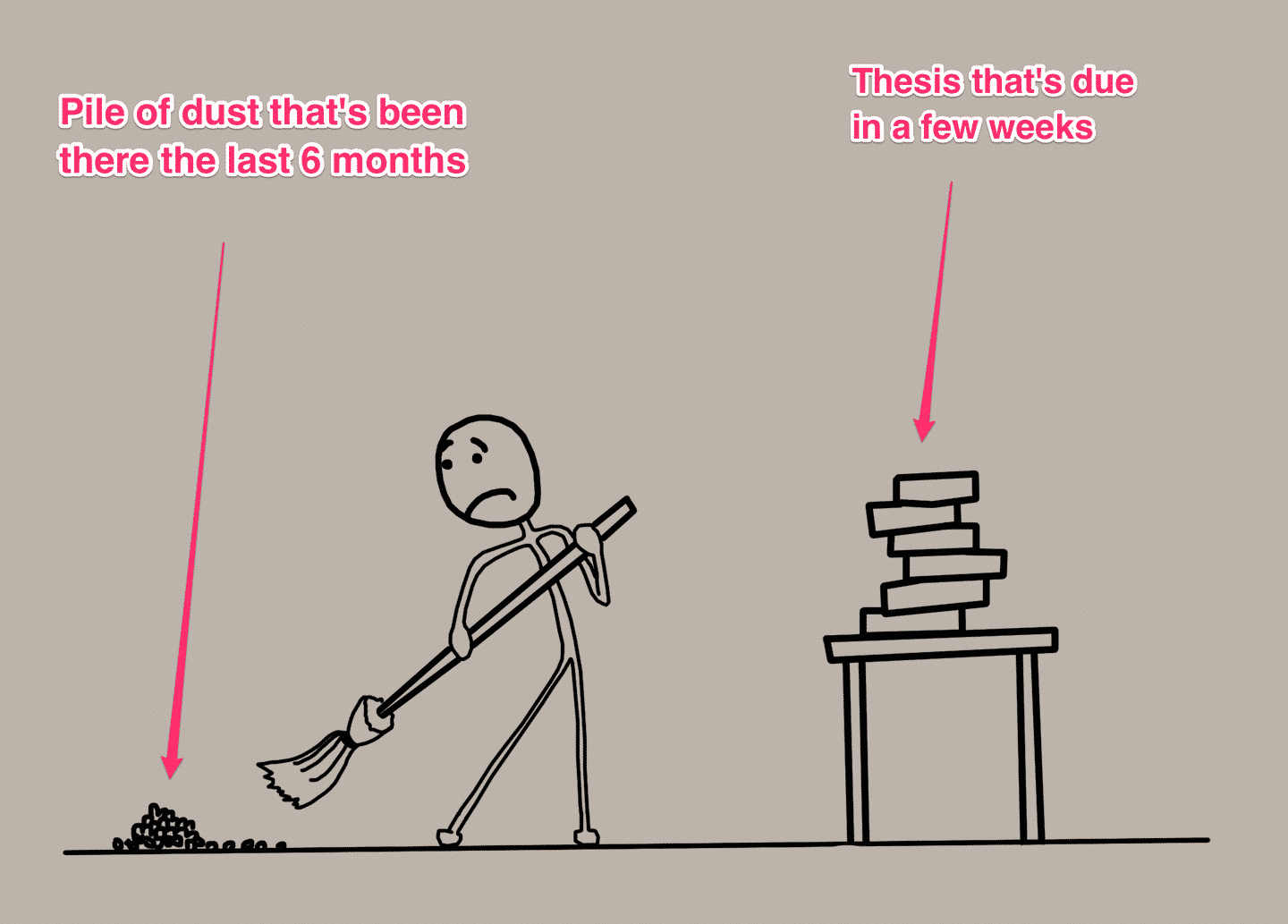
It was time to face the truth.
My failure turned my life into a chaotic mess, and even though I have a higher tolerance than most to operate in spaces with incomplete information, having played poker professionally for many years, and have a strong trust in myself that no matter what, I will always find a way, I really didn’t find this to be a nice place to live.
I score high on the openness personality trait (in the Big Five system). Basically, this means I am creative and always see options. Historically speaking, I also used to score very low on conscientiousness, and relatively low on industriousness. This is not to say I am not driven, I have always been quite ambitious. I entertain myself achieving grand visions. It is just that I used to be easily distracted by other seemingly important things, and settling for good enough, especially if I thought I could get away with it. (The perils of having a dominant external frame, more on frames soon.)
Now, there are people who proclaim procrastination is a sickness. And that might very well be the truth on some level. But if that is true, I believe the cure can be found within us.
And beyond this, as the literature unequivocally shows, besides general intelligence (IQ), the best indicator of long-term success is conscientiousness—the capacity to self-discipline, act dutifully, and strive for achievement.. It doesn’t matter how crafty one is, if you can’t put it to action, all of your cleverness is worthless. My conscientiousness used to be utterly terrible.
You can’t rely on or trust someone who procrastinates. It is a childlike attitude of someone who can’t handle the difficulties of life. Follow-through is the only thing that separates dreamers from those who accomplish great things. So, it was time for me to change.
The purpose of life is finding the largest burden that you can bear and bearing it.
― Jordan B. Peterson
In order to overcome procrastination once and for all, I began digging into the literature on procrastination, motivation, emotional avoidance, self-deception, suffering, and why it was absolutely necessary to find meaning to make existence worth the struggle. Since then, I completed my thesis, finished all projects I was avoiding, and am now aiming at constantly slaying more Procrastodragons, in order to claim the powerful treasures they have hidden.
I am a changed man.
This is how I did it. And this is how I believe you can do it too.
So What is Procrastination Now Exactly?
A goal without a date is just a dream.
— Milton H. Erickson
One of life’s challenges is to engage ourselves in activities that make us feel anxious, inadequate, insecure, incompetent, lonely, hopeless, afraid, angry, guilty, depressed, frustrated, or bored. If there are no social, physical, or financial consequences—external pressures—to our avoidance behavior, most of us will default to do nothing in order to preserve time and energy.
We avoid tasks that make us feel weak, postpone them indefinitely, and develop an aversive attitude to them. This gives rise to a life-denying attitude that implies life is not worth the struggle. It implies you don’t see enough meaning in existence, in what you do, to muster up the courage to get your act together.
This is procrastination, the voluntary delay of an intended task, where dreams are pushed silently over your future horizon until it is too late.
Even though we know we intended to do something, like finishing our homework, do our taxes, or make an appointment to go to the dentist, and we have time to do it right now, we still end up rather aimlessly browsing newsfeeds, dank memes, and other insignificant distractions.
We know our future self will despise this behavior, we know we miss out on the gratification of finishing our intended tasks and the growth that comes from challenging ourselves, and we know our self-image takes a massive blow. We feel a low opposite to the high of accomplishing something, yet we continue this emotional avoidance behavior.
The costs of procrastination are substantial. At its very core, you are postponing life itself. You are delaying the growth and insights that accompany overcoming the struggles associated with life. You fail to engage with the world in a constructive way. You fail to build character. The time that is lost to procrastination is impossible to make up for in the future.
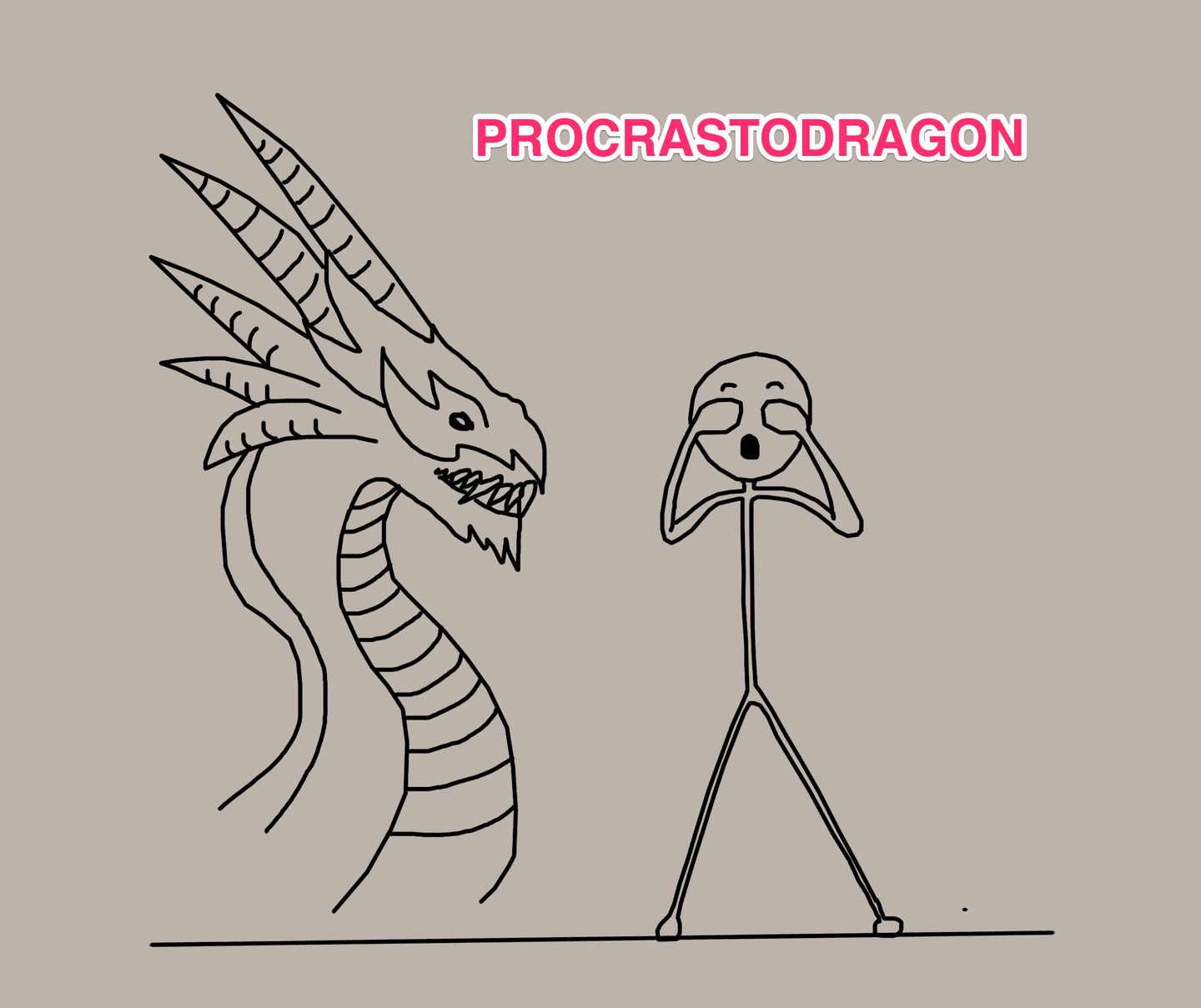
The Procrastodragon keeps growing and amasses more and more wealth from you.
Why, if procrastination has such a detrimental effects, do we continue in such self-defeating behavior? In psychological terms procrastination is seen as a form of self-regulation failure. We suffer from a form of perceptual disorder. We avoid tasks we find aversive by momentarily giving in to feeling good. Instead of writing that important e-mail, we open Facebook first.
Because we want to avoid feeling bad we keep avoiding the task that makes us feel bad, and instead, we do something that makes us feel good, postponing the task, imagining ourselves doing the task, or finding reasons why we shouldn’t have to engage with it at all. This only increases the intensity of the negative emotions over time, making us more prone to avoidance.
On top of all this, since we don’t want to see the damage we do, as we want to keep our precious self-image intact, we distract ourselves from admitting that we do procrastinate, and we repress any feedback which tells us otherwise.
In the short term, it is extremely tempting to have just a little bit of fun when we feel anxious or lacking. But the voluntary delay of desired long-term goals in preference for an immediate reward will eventually fill us with regret, guilt, and self-blame.
Hours, weeks, or even months later, we look back and we scratch our heads and wonder where all the time has gone. And often, the things that appeared to be fun actually swallowed our existence and were never really enjoyed at all. Plagued by our conscience, we know very well we are borrowing from the future and accumulating a debt that deep down we know we can never pay back.
It is quite common to create elaborate, but detrimental, behavioral pathways to keep our self-delusion in check. The last thing we want to admit to ourselves is that we are failing and need to change. But to keep the emotional content repressed we also block the flow of life within us, we create dishonesty at the core of our being. Even though this costs us in the long run we actively choose to not notice it in the short term.
We set our future selves up for failure. We treat ourselves in a way we would never treat those we love.
How to Overcome Procrastination
I want to make asceticism natural once again: in place of the aim of denial, the aim of strengthening; a gymnastics of the will; abstinence and periods of fasting of all kinds, in the most spiritual realm, too.
— Friedrich Nietzsche (KSA 12, 9 [93])
You cannot be protected from the things that frighten you and hurt you, but if you identify with the part of your being that is responsible for transformation, then you are always the equal, or more than the equal of the things that frighten you.
― Jordan B. Peterson
The first step to overcoming procrastination is to acknowledge that it simply doesn’t work. Trust me, I’ve tried all possible forms of avoidance. The Procrastodragon never really goes away, and in many cases, our fears towards confronting him grow substantially bigger.
It is in its very essence a failing strategy.
No good comes from it.
On a more fundamental level, overcoming procrastination for good begins by acknowledging that the suffering of life cannot be avoided.
The fundamental constituents of our own being are not material. They are emotional, motivational; they consist of dreams, visions, and our relationships with others and with ourselves. They are based on experience, the very phenomenological qualities of being, namely how we experience things, the qualia and phenomena of our world.
As Dr. Jordan Peterson never gets tired of pointing out, there is nothing more real than your own pain. You can’t argue yourself out of it.
The nature of being is suffering. We all know we will die. We are finite. Limited. We are fragile creatures. There are many arbitrary facts of being outside of your control, your height, and your intelligence to a great degree, the place and time you grew up in. These are not flaws in your own being, you didn’t choose your parents, and instead these are the conditions of existence. One of these facts is that the suffering of life cannot be avoided.
Then the question becomes: How do you conduct yourself in the face of suffering?
This is the most freeing realization. That life can’t be conducted without suffering. You will fail and you will lose those you love. You can’t avoid it. There is no way out.
So, rather than hoping this will change, that the tasks of life will end one day, a much more constructive take on the situation is to see these as levels to progress, and you needing this level you are now to power up and to be able to handle the next level. Ad infinitum.
Do not pray for an easy life, pray for the strength to endure a difficult one.
― Bruce Lee
(As a side note I will explain in further depth in a moment, one can actually strategically increase (potential) pain to make you stronger to force behavior deemed valuable.)
If suffering is inevitable, we must then ask ourselves, can we aim at something to make life worth living despite its inevitable suffering? If we know we are going to experience the full range of human emotions either way, is there perhaps something we can do, so that in the end, we can look back, and be proud of what we accomplished? Even in the face of old age, sickness, and death? In the face of impermanence, evil, and malevolence?
The price you pay for being is suffering. So stop looking for a way out … and find a way through to make it worthwhile.
Ultimately, you must take full responsibility for your own being. When you do this, you’ll see that everything you do matters and every little task you’re engaging with is meaningful. Until you value yourself, you will not value your time. Until you value your time, you will not find anything valuable to do with it.
For now, just remember that the virtuous path is worth pursuing because it justifies being to itself.
To learn how to aim properly (the value of this cannot be understated) Jordan Peterson’s Future Authoring program or our Proust’s Pupil Challenge is worth considering here.
Curse the Warmth of the Bed
We are defeated one tiny, seemingly insignificant surrender at a time that chips away at who we should really be. It isn’t that you wake up one day and decide that’s it: I am going to be weak. No. It is a slow incremental process. It chips away at our will—it chips away at our discipline.
— Jocko Willink, Discipline Equals Freedom: Field Manual
The next step to overcoming procrastination is upgrading your belief about negative emotions. From a hedonistic perspective, born out of our instant gratification culture, negative feelings are to be avoided for a life of happiness. In a way, hedonism implies procrastination. However, you are greatly weakened by your belief that life is for happiness, simply because that as a philosophy, that only happy things are valuable, cannot endure any sustained challenge.
From an Áskēsis perspective, the “gymnastics of the will” is in need of negative emotions as resistance to overcome. You need ever greater exposure to fears, anxieties, and failures to be able to experience and handle the full potential of life. In this light, one needs temporary experiments of willpower undertaken with the intention of strengthening, mastering, refining, and deepening self-understanding— these are necessary requirements for growth. And from a non-hedonistic perspective, meaningful happiness.
It is essential to start recognizing how your primitive drives want to eliminate negative feelings, and by putting off a task you gain temporary relief that makes you feel good.
Do you see the pattern?
This self-deception pattern is caused by what psychologists call intransitive preferences. On Monday we prefer to do the task on Tuesday. Tuesday we prefer we do the task on Wednesday. Wednesday we prefer to do the task on Thursday. Thursday, we are like, shit, I wish I had done it on Monday.
Looking forward with time to spare, our preferences are different from looking back with no time to spare. This is “how we can make a series of choices that are preferable at each moment, only to later regret that we didn’t start earlier” according Chrisoula Andreou, a philosopher of procrastination at the University of Utah.
This is how we fall into the trap of what is called ‘mood repair’. We engage in something other than the task we know we should be doing because we want to feel good now.
How do you get out of this addictive and weakening behavior revolved around short term fulfillment?
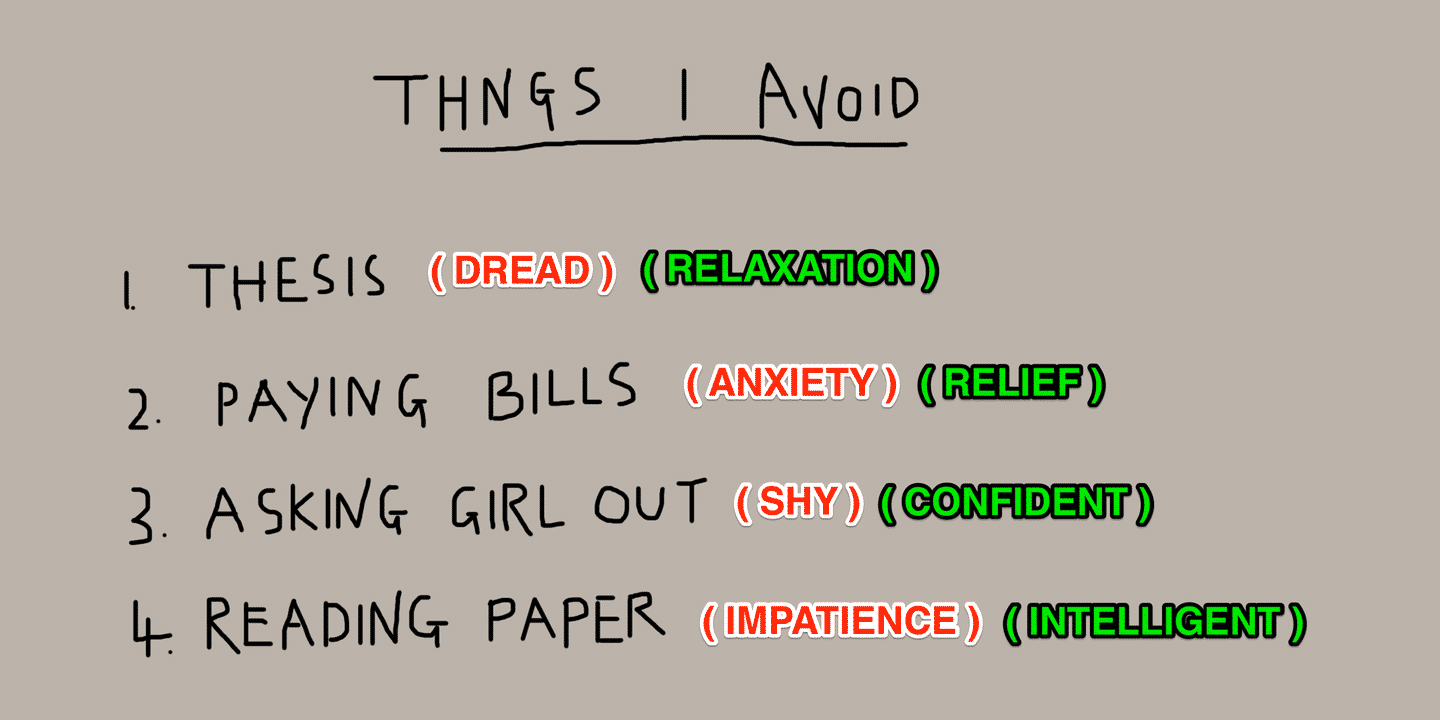
This is how I started:
- Make a list of all the Things you have been avoiding. Write every single Thing down: the big Things and the small Things; Things in your personal life and your professional life.
- This is essential. Next to each task, write down the emotion you feel in your body when you imagine yourself approaching and engaging with this Thing. Focus on anything that can be seen as negative, resistance, and aversion.
- Now, with your upgraded belief, make a mental note that whenever you feel these feeling, you are aiming at the right Thing. You are going in the right direction.
- Next to the feeling you have while doing the Thing, write down the feeling you feel when you imagine yourself having completed it. Use the stick and the carrot.
The psychologist Peter Gollwitzer has conducted lots of research on the psychology of action and has found that when it comes to goal-setting, telling ourselves what we want to do is not as effective as deciding beforehand our exact intention followed by how, when, and where we are going to implement it. He calls this technique implementation intention, and it’s most commonly expressed with “if… then” statements.
I recommend setting an implementation intention for every task by repeating the following, “Next time I feel [emotion] associated with [the task], I don’t want to avoid it any longer, and I will use the [emotion] as a cue to get started immediately.”
Go back to this list often and repeat your implementation intention as often as you can. Imagine yourself truly engaging with the task. Make it visible. Feel the feelings and invite them in.
Reframe the emotions you label negatively as opportunities to grow.
Instead of suffering through the downward spiral of avoidance, actively engage with and search for avoided tasks and avoided emotions and transmute them into fruits of accomplishment to spur on growth.
Knowing that the whole spectrum of experienced phenomena is necessary for life itself. You can learn that you need to feel a certain way in some circumstances, it is a given, and that by avoiding certain tasks you avoid the life lessons that are specific to you learning to feel and deal with that emotion.
Negative emotions are your support. They are wise teachers that correct your behavior. Keep you balanced. They lift you up. They prevent you from making mistakes. They calibrate your direction. This is why deadlines raise your support level, because the intensity of the negative emotion increases when you are nearing the due date.
Consider taking our Anti-Procrastinator Challenge and our entire challenge course, 30 Challenges to Enlightenment.
Don’t Wait (For The Right Time Nor The Right Mood)
Let go of the misconception that our motivational state must match the task at hand. In fact, social psychologists have demonstrated that attitudes follow behaviors more than (or at least as much as) behaviors follow attitudes. When you start to act on your intention as intended, you will see your attitude and motivation change.
― Timothy A. Pychyl, Solving the Procrastination Puzzle: A Concise Guide to Strategies for Change
Change will lead to insight more often than insight will lead to change.
― Milton H. Erickson
The following step is acknowledging that your motivational state does not need to match the task you intended to do. You can feel an unpleasant state and still go ahead with it.
Once we learn to accept our feelings as they are we find that we can take action without changing our feeling state. The only area of control, then, is the area of behavior—disciplined behavior. We can depend on taking action even though feelings fluctuate and the external world keeps throwing bigger obstacles our way.
The standards we set for ourselves provide the only stability.
It takes courage to commit yourself to a task while allowing yourself to feel something considered unpleasant. You want to get away from it but instead you stick around.
This builds character.
If you have been a long-term procrastinator, like I was, just know you need to feel worse before you can feel better. Your deeply seated emotions that have been unaddressed and locked away need to be bared naked in front of the light and embraced fully, while you keep the intent to act intact.
This is neither an easy, nor a comfortable process. From an early age you learned to stay away from pain and discomfort. The ego goes out and limits the body on what it should and shouldn’t feel. The timing never feels right. Your mood never inspires hope. However, you can learn how to overcome such faulty conditioning if you willingly open up to these feelings.
In fact, the more dissonance we feel approaching a certain task, the more lessons are contained within it. This takes honesty. You need honesty or else you can’t trust your intuition. If you lie to yourself you corrupt the structure you use to interact with being.
Honesty is painful. Most of the things you tell yourself are not real. They are just excuses, justifications, and reformulations.
Stop lying to yourself, it makes you weak.
You take a step and you become wiser. And you correct yourself across time. You keep chasing that which is meaningful.
Set Standards for Yourself
Hold yourself responsible for a higher standard than anybody else expects of you. Never excuse yourself. Never pity yourself. Be a hard master to yourself.
— Henry Ward Beecher
The next step is to consciously set standards for yourself. A self-standard includes your purpose, conviction, ethics, principles, motivation, and conduct. It is a very clear line on what you do tolerate from yourself and from others, and perhaps even more importantly, what you will not tolerate.
Overcoming procrastination by setting standards for yourself is a form of inner nobility, namely an internal commitment to actualize your potential
To do this, you must build an internal frame. An internal frame is a belief or boundary that remains in place no matter what external feedback you’re receiving and no matter how you’re feeling. When it comes to procrastination, this means you don’t tolerate excuses and you don’t let your moods decide whether you will complete a task at hand.
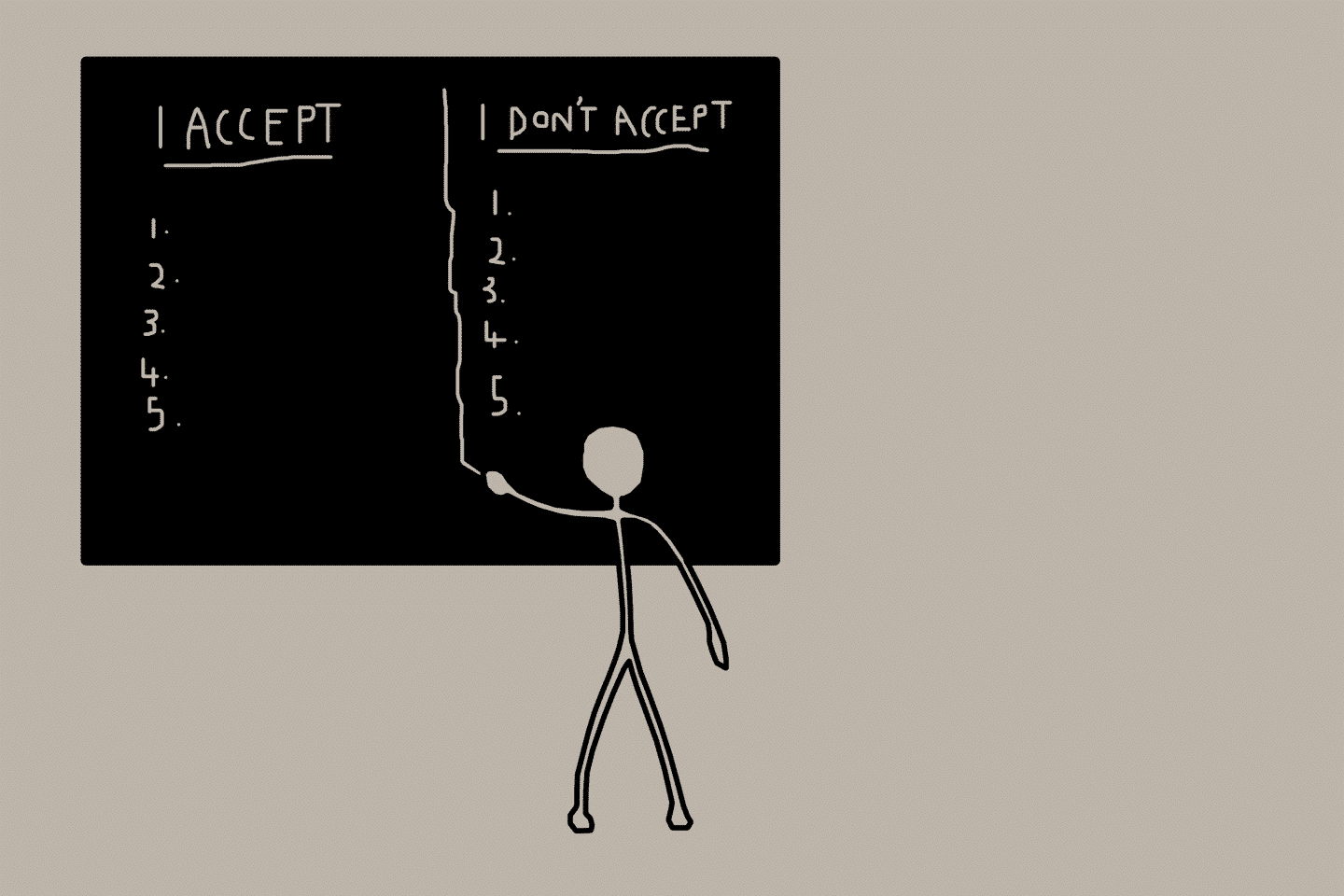
Here are a few of my current personal standards:
No matter what storm I am weathering I am staying on purpose.
How I feel is secondary, what I accomplish primary.
Whenever I have concluded a practical step towards a goal, I set a deadline for myself earlier than it should be done.
Even if I just have a minute, I will look for something important to do, and will start working.
I don’t entertain thoughts about whether it will work or not, after having decided it needs to be done, I just act and go for it.
I want to make conscientiousness one of my strength, not tolerate it any longer as one of my weaknesses.
By changing your shoulds to musts you raise your standards and, in turn, you will rise up to meet them. Your actions, beliefs, and the people around you will be a reflection of this filtration system. One could say that a well-developed and sturdy internal frame is the basis of all good habits, especially if you want to stop procrastinating.
In essence, it turns incoming chaos into order. Like a Polaroid which filters incoming light.
This is something the philosopher Peter Sloterdijk calls a “psychological immune system.” It can handle incoming randomness and create a structure out of this, without you losing your mind, feeling overwhelmed, or run away. A structure which you can then extend outward, taking on more and more responsibility, becoming more and more dependable for others, and getting closer and closer to your aim.
Make your standards non-negotiable. Whatever you decide your internal frame will be with regard to procrastination, commit to it 100% of the time. Take away all indecision.
Don’t Give In To Feel Good
Mental toughness is many things and rather difficult to explain. Its qualities are sacrifice and self-denial. Also, most importantly, it is combined with a perfectly disciplined will that refuses to give in. It’s a state of mind-you could call it character in action.
— Vince Lombardi
On some level, we are primitive animals. When we are hungry, we want to eat now. When we are sleepy, we want to sleep now. When we are cold, we want to get warm now. On another level, we can override these biological impulses, and keep going even while we feel tired. What makes humans categorically different from most animals is that we can postpone immediate gratification in order to gain something greater in return. Not eating seeds now so we can harvest more food later. Not stop working out now so we can recover stronger. Not give in to mood repair now and feel the joy of accomplishment later.
In the long run, we can minimize suffering by bargaining with reality. If you look at the history of our species, we have learned to extend trade-offs further and further away into the future. We can dedicate thousands upon thousands of working hours in order to land on the red planet in the future. To sacrifice something in the present we can work towards something much bigger that exists in the future.
Do you aim for something meaningful that when the time comes, you are willing to sacrifice things dear to you?
Hack Your Support and Resistance Levels
The positive intention of fear is risk control.
— Ed Seykota
Please have a look at the following, somewhat poorly designed image.
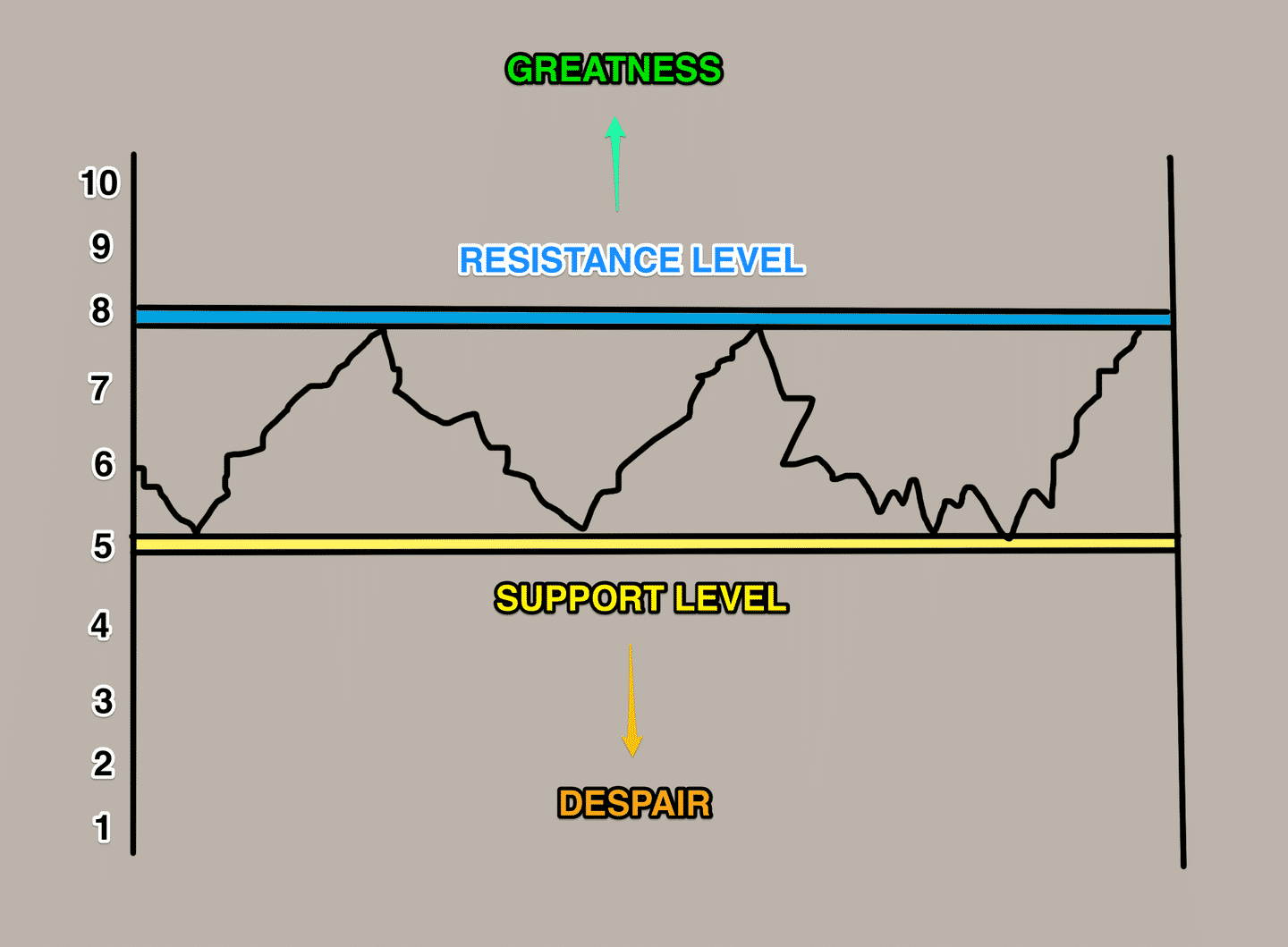
Imagine a spectrum between 1 and 10.
Acting like a 1 is always giving in to feel good and never accomplishing anything. Just playing video games all day and eating fast food. At 1, you have no social life, do no physical exercise, and work at no job. You do not make any sacrifices for any higher good. Nobody depends on you, you have no responsibility, and you don’t find anything meaningful to contribute that would have otherwise made life’s intrinsic suffering worthwhile. You not only have a nihilistic outlook, you embody it. In essence, it is shooting up heroin and not caring whatever else happens to you and your surroundings.
Acting like a 10 is never giving in to momentary feel good. You always do what has to be done. You proactively seek out more things to do to make your immediate surroundings the very best place. You look beyond what you are capable of right now to see what else needs to be done. You know time on this planet is finite, and you have a purpose and aim that you want to accomplish, a greater good that informs your self-standard. You know you are wired to experience most of your joy and curiosity as a consequence of pursuing valued goals (and not, as people generally tend to think, by attaining them). You take great self-care in order to keep going. People want to work with you and give you responsibility. You never feel the weight of guilt of not having done enough. You have your shit together and can support others to do the same.
Now, nobody is a 1 or 10. This is just a grading system to interpret behavior. People who are able to rise above their limitations and only fluctuate between 8-10 behaviors are admired and respected. They are held in high esteem. Others, who fluctuate between 1-3 behaviors are often avoided, shamed, and looked down upon. I am sure you can find examples covering the whole range.
Most of us fluctuate between five and eight.
The
yellow lineis your support level. Your support level consists of those standards that won’t let you fall any deeper. You won’t let it get any worse. You feel this when you chaos comes so close you are unable to stand it anymore. You haven’t done the dishes in a few days, and it starts to become a smelly pile. A deadline is nearing fast, and now you really need to start working, or else the consequences of not doing that will seriously set you back in life. Basically, moving below your support level makes you feel so uncomfortable, you rarely, if ever, let this happen. For a chronic procrastinator, your support level is on the lower end. You accept more from yourself than is good for you.
The
blue lineis your resistance level. You feel this when you give in to feel good. For most of us, this is when we already accomplished something: We hit the gym; we finished that project; we got a good grade; we paid all bills; and we called our grandmother. But then, we binge on Netflix, get sickeningly drunk, keep smoking cigarettes, put off our passions and dreams. For a world-class performer with a higher resistance level, there are still minutes in the day to study something, to write that extra e-mail, to journal self-reflectively and see what he or she could have done better that day. For a chronic procrastinator, the upper level is when you just made a list, feel like you accomplished something significant, and take the rest of the day off.
Without clear conscious standards, you will just act out impulsively, letting your environment and feelings dictate your behavior, rationalizing backwards into a consistent self, changing your standards along the way. You fluctuate randomly between the support and resistance levels that have been given to you from your familial patterns, cultural values, and biological inheritance.
Lacking a sovereign on top, one that set clear boundaries and goals, you’re like a two-year old acting out one emotional frames after another.
Instead, what must rise to the top is that part of you that pays attentions, learns, and decides what needs to be done.
This means that you try to raise both your support level and your resistance. Instead of waiting to do all multiple day dishes at once, you rinse them immediately and do them daily. No matter what. Instead of doing things last minute, you do them whenever you have a minute to spare.
You don’t stop until you’re done… and you’re never done.
It goes without saying that you need to take adequate self-care in consideration. Deserved rest is essential. And this is not just about work either. It is about becoming a great friend, a caring lover, a good son or daughter, a dependable employee or partner, and an informed citizen.
And while this might be much harder for artists and other creative types, the fact that people don’t struggle with this equally cannot and should not be used an excuse whatsoever. Creative genius is often coupled with extreme output: Leonardo, Michelangelo, Picasso, Van Gogh, just to name a few.
There are two powerful ways to raise your support levels. A simple one is to set deadlines, especially ones you are held accountable for. Beyond deadlines Another way to raise your support level is to make precommitment bets, which is an agreement you make with others to put money on a habit. For example, right now, I have committed $10 to meditate 20 minutes everyday until January 1st, $10 to record a 10-minute audio improv for 30 days, and $250 dollars for 80 hours of tracked productive work time per month for one of my projects.
Now, a few questions really worth thinking about are:
Howclose would you like to have your support and your resistance level?
How would that look?
What self-standards would you need?
What would your life be like if you made use of all your potential that you have been given?
Gain Momentum by Cleaning Up Your Room
If you fulfill your obligations everyday you don’t need to worry about the future.
― Jordan B. Peterson
Now, when you take your procrastination to-do list on which you mapped out all the tasks and the accompanying emotions, the one I suggested you make earlier, you will find some to be small and some to be big. All of them are important, as all of them add more order to your life, and you can withstand just a little bit more chaos.
The most important thing to do is to just start winning. Probably some of the biggest tasks you have been avoiding the most are the most difficult, because there is a sense of hopelessness that you aren’t able to do it, or reach the perfectionistic standard you have set for yourself. It is fine to leave these for another day this week. Just get started.
I listened to Jordan Peterson recently talking about lobsters. That if two get into a fight, the winner opens up his posture more, advertises to the world that he is a winner, and has a higher chance of winning the next fight. This is based on the same serotonin system that we evolved from. The reverse is true for the losing lobster. They lose, and keep losing. Give the loser a Selective Serotonin Re-Uptake Inhibitor, a human anti-depressant, and they will act more like a winner.
Now, the same is true concerning winning and accomplishing things you know will make your life better. You don’t need to know everything before you start. Just by finding out what the next step should be, you are more likely to get the next step done, and the next one, and the next one. By beginning to clean up your room, for example, which is one of the things in your immediate range of capabilities, you free up space for new opportunities and new growth, slowly turning your life into an orderly and deeply meaningful experience.
Try this for a week, and see how you feel. In time, as I did, you will fix things before they get irreparably broken. You pay the bills before they come for the money. You become proactive instead of reactive. I was always avoiding something that was making me anxious, but since I have been consistently doing these numbers of commitments and fulfilled my obligations, my worries about the future have virtually dissipated.
This is what it means to eat your frog. Start with a win. Preferably the biggest one you can do now. Keep winning.
Challenge Yourself
With an attitude of learning, everything becomes a challenge rather than an obstacle. It’s a totally different way of looking at life. A challenge is something very positive. In fact, the deeper the challenge, the deeper it can take you into yourself. It can release all kinds of captive energies; all kinds of creativity. It can release blocks so that it will be welcomed even though they may be uncomfortable.
— Larry Rosenberg
Life is very difficult. It will challenge you to your core. You need to be able to withstand that challenge or you’ll warp and deteriorate. How do you develop yourself to withstand that challenge? You take on responsibilities and challenges voluntarily, and strengthen yourself.
How else could you possibly do it? I mean you could hide, but there’s no hiding. You can’t hide from illness and death. You can’t hide from loneliness or pain. It’s not possible. And if you retreat then the things that chase you just grow larger.
So you have to put yourself together. And you do that by seeing what’s right in front of you, regardless of whether or not you like it, and encouraging yourself to master what you see voluntarily, and to extend yourself and stretch yourself out constantly. And you do that with your eyes open. And you do that with your speech and thinking carefully monitored and regulated so that you don’t corrupt yourself with unnecessary ignorance and delusion—because that will just hurt you when the crisis comes.
— Jordan B. Peterson
The essence of a challenge is to posit an ideal to strive towards. In relation to this ideal, you always fall short. But that is not the point. The point is to have an aim. To actually take steps towards your goal. You make a kind of agreement with your higher self. You look at yourself from above, find out what is still weakening you, and you make a pact that for a period of time, you will strive to let go of that which no longer serves you, and to make room for habits that will.
It is this agreement with your future self, that self you want to look back at you this very moment, and wished it had done the things that needed to be done. It is a momentary sacrifice, in which you don’t give in to momentary pleasure, that will return the stronger self you know you’re capable of.
One challenge I, my friends, and hundreds of course members have had amazing success with, especially combined with the understanding found in this article, is to do the 3 most important things you have been putting off the first thing in the day, for 30 days. Just as an experiment. Just see how your life changes. Confirm that this is you are wired, and what you have to do to make your existence worth the challenges.
Breakout
If you accomplish something good with hard work, the labor passes quickly, but the good endures; if you do something shameful in pursuit of pleasure, the pleasure passes quickly, but the shame endures.
— Musonius Rufus
One of the most fascinating realizations you will have, once get your act together, is the disqualification of the subconscious fear that the more tasks you do, the more difficulty you will have to endure. As long as you behave under your resistance level, everything above you can feel like a solid and impenetrable massive wall of granite, rendering almost any attempt to transform utterly futile.
Nothing is further from the truth, however.
Levels look different if you’re looking up compared to when you are looking down. The anticipation before an event you feel averse to often feels worse than the event itself. Your imagination fuels itself with your worst fears, tyrannizing your existence.
Yet, the moment you actually go ahead and confront the dragon of chaos, as Jordan Peterson would put it, the anticipation goes, it disappears, and what remains is the mere memory of the event.
The crucial difference when you act is that your self-image changes.
Instead of someone who couldn’t handle it, you now see yourself as someone who overcame the obstacle, and became someone who could face his Procrastodragon.
Your perception of the task changes over time, as we tend to overestimate the difficulty pre-task and underestimate our enjoyment post-task.
We humans are notoriously bad at affective forecasting.
Like, terribly bad.
This is really the key. The moment you stop running away from the Procrastodragon, you stop feeling like a coward, who consequently is only able to do cowardly things, and instead, you start feeling like the hero on his journey, who learns to do heroic acts of courage.
From now on, just assume you underestimate how great it feels to actually have done everything you know you should have. The contentment, the deserved rest without your thoughts nagging at your peace, the competent feeling you can handle life, the knowledge you have things under control, is worth infinitely more than any momentary good feeling.
And most importantly, the confidence you feel can withstand the fear which prevented you from acting in the first place.
Instead of a granite wall, you will find a breeze of fresh air on the other side, invigorating your dreams and potential. There is no greater feeling than moving closer to the person we want to become. Breaking through to new levels is exhilarating.
In Conclusion
You don’t get to choose not to pay a price, you only get to choose which price you pay
― Jordan B. Peterson
You’re here now, in the midst of life, full of challenges you would rather not have to face. But you’re here now, so you might as well get started. Might as well turn your own being into a work of art. Don’t believe for one moment there is a perfect moment to engage with the Thing you have been putting off. There will never be one. You won’t feel more in the mood to do it—more motivated—later, tomorrow, next week, or any other day. You just won’t.
The feeling you want to avoid is inherent to the task at hand. So you have to either admit you’re never going to do it or that you’re going to do it, no matter how you feel. There is no in-between option. If you think there is a way to get the things done you aspire to without having to suffer to get there, without making sacrifices, you are trying to paint a rosier picture of reality than how it actually works. You’re trying to deceive yourself.
Motivation follows behavior, not the other way around. So don’t look for motivation first. Look at what needs to be done. Look at why that is meaningful to you personally. Look at how you would feel if you don’t do it. Imagine yourself a week from now if you didn’t do it. But also imagine who you could be if you did started today. This very moment.
Start mapping your emotional patterns to find a way to stop playing yourself. Get some self-respect. Start valuing your time. Set some ideals. Aim above. Trust your potential. Go for it. We need more people who get their act together. You will be rewarded in unexpected ways.
Draw up your own support and resistance levels. See where you are lowering your standards, find out where you give up before greatness. Discover how avoidance seems to be a solution to a problem that in actuality only makes the problem worse. Be very suspicious of any further delay and any justification of delay. Learn to recognize your self-delusional patterns.
Don’t give in to feel good. It doesn’t feel good. It only has the appearance of such. In fact, before long, you will feel horrible. Your self-image will take a nosedive, and others will neither count on you, nor trust you. Even though a moment of distraction might feel tempting, don’t give in to feel good. Just don’t.
Make it your new standard.
Keep doing this. Keep setting standards for yourself. This is how you get bored by the meaninglessness of your distractions. They don’t serve you. They don’t serve your purpose and mission. They will always feel empty and unsatisfactory.
Distractions feel nice simply because there is nothing at stake.
Work on your internal frame. Really. Don’t wait for reality to catch up. You’re on your path. You’re going your way. It doesn’t matter if you have doubts, don’t feel perfect, or don’t have the “right” material conditions. Just get started. You can learn on the job.
Notice your motivation, your self-image, and your mood will start to improve as a consequence of living by your own standards. You will find that you are less dependent on external things than you thought you were. In fact, you actually gave your power away by having external things hold power over you. Your perspective will make a Copernican shift.
By taking steps every day, no matter how small, no matter how ridiculous your dreams are, if you know them to be good, and you feel that what you create should exist no matter what, you will discover the transcendental meaning that makes the inevitable suffering worth it.
Find more resistance in order to grow into a stronger being. This is what humans need. What humans crave. Take this away, and they will go crazy.
Live like this this, and after a while you will in fact crave more resistance, more responsibility. You will start to see there is nothing more inspiring and helpful than to lead by example. To be the person you wish existed in this world.
If you feel a lack of meaning in your life, if you struggle with procrastination, if you don’t have clear standards for yourself, if you struggle with expressing yourself authentically, if you need someone to help you find your way through this maze of self-deception and overwhelming emotions, consider reaching out to me. I promise you, I will do everything in my power to help you get your shit together.
Consciousness is a mystery that faces the mystery of potential and transforms it into actuality. We do that with every choice we make. Our choices determine the destiny of the world. By making a choice, you alter the structure of reality.
― Jordan B. Peterson
This article is based on the 30 Challenges to Enlightenment Guidebook (click to look inside).
If you want to learn how you can embody the insights contained in this article, consider taking our course and challenging yourself to become a more enlightened version of you.










